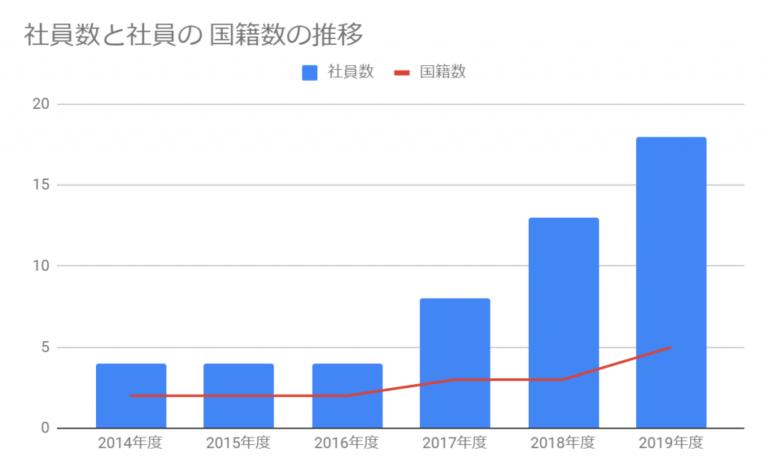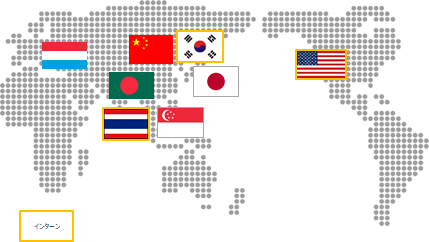Reasons and Strategies for
International Talents Recruitment
2019/8/29 Janell Lau
Current report on international HR
With previous partnership with Meiji Gakuin University, we had taken in exchange students from UCLA and UC Berkeley as short-term interns.
Prior to this, Innovative Solutions Inc. (ISOL) has been recruiting foreigners as full-time employees from 5 countries (varying from Japan, China, Singapore, Bangladesh, Luxembourg) and interns from 8 countries (Japan, Singapore, Vietnam, South Korea, China, France, America, Thailand) respectively.
Out of the official full-time employees recruited from the internship track, there are 2 (foreigners) whom were employed after graduation that contributed to the multicultural diversity of ISOL. Moreover, out of the interns who returned to their home countries, there are those who applied their knowledge learnt here back to what they are doing today within similar fields.

Employees Profile (Employee Count and No. of Nationalities)
Red line: No. of Nationalities
Blue graph: Employee Count

Why active international recruitment?
– DIVERSITY is the keyword
We are a solution vendor that solves client problems with the synergy of IT and know-hows from operations. There are various ways but ‘understanding the status quo’ is the first step. It is crucial to identify the occurring problems from different angles and seek the root causes. The very much needed element at this point is diversity in perspectives.
Varied perspectives are also important in the process of building and implementing solutions. Often, a solution that was effective for one client may not work as expected for another. There are a multitude of considerations, like certain specific circumstances such as differing working environments of laborers, or the specific business processes and/or the differing implemented business application.
If solely Japanese human resources are recruited, ideas and viewpoints would be biased, in which becomes impossible for a global company to provide better solutions to clients whom are also suffering from incorporating diversity of their own.
To prevent this, ISOL is taking active measures as one of our globalization efforts by recruiting foreigners.
Partnership with overseas companies, a bridge to overseas expansion
The three founders of ISOL had past experiences of business establishments with overseas partners, in which relationships are forged that are of great help today. Thanks to this, there are ongoing sales and technical exchanges with companies in various countries in the United States, Uruguay, China, and Bangladesh. In such international cooperation, consultants and developers from ISOL must be well versed in various languages. In the long run, entering the global market is also one of the reasons in our active international recruitment. If the provision of market know-how and solutions in a mature market like Japan works, we can expect potential to grow in developing countries. Our mission is to create value together with our valued clients. Thus by recruiting and nurturing international talents, we contribute to the global market indirectly.
Recruitment Process
Our CEO previously ran a Chinese offshore company with one of our executives who had been in charge of the solutions division. Since then, there have been many exchanges with Chinese engineers who had contributed greatly to the foundation of this company, Innovative Solutions Inc., with many employees who joined through referrals and introductions.
Both the Bangladeshi technician and Luxembourgian sales representative were introduced by the same contact. While there are some interns recruited from a recruitment platform for a short period of time, most of our employees are recruited either through past connections or from personal social networks.
We consider ‘Diversity’ as part of our company culture. We value those who can respect diversity and embrace it to build mid to long-term partnerships. As mentioned, while our company composes slightly fewer than 20 people, we are a multi-cultural organization with a total of 5 nationalities (plus 2 including interns). In the future, we aim to expand our network while focusing on our recruitment, cross more borders, and achieve a greater reach in global footprint.
About our Interns
While we have leveraged on third party recruitment services, recently, we have been introduced to increasingly more acquaintances from our own employees or business partners. These new introductions come from varied university and faculty, and from various technical backgrounds across the technical and business fields.
Our internship program duration also varies. The shortest internship period was 2 weeks, which a scholar from Thailand went through. After explaining the contents of our service to the intern, she received training on our IT solutions. The person in charge of this training was a Chinese employee who was previously an intern as well. As a trainer, she would study in advance in order to pass down her knowledge to the new intern, which would in turn contribute to her own learning.
Prior to the partnership with Meiji Gakuin University, we also partnered with a French university that also brought in an intern for 6 months. We went through various paperwork to bring in a foreigner including visa arrangements. As the intern was majoring in International Finance and Business, with specialization in Project Management, we tasked him in the area of Logistics and Business Process Management (BPM). Through this recruiting process, we were able to understand better the recruitment process for international hire.
As shown above, not only do we welcome interns to our firm, we provide them with opportunities that are helpful to them as much as possible. Fortunately, two of our previous interns have started to work here full-time, we put in careful considerations into each and everyone’s skills for both parties to benefit. We definitely hope that the interns would consider us as their next step in their career.
Cross-Culture Communications, Reverse-Mentoring
As more and more diverse human resources gather, enjoyable social activities can be conducted within a cross-cultural community, which we call ‘reverse mentoring’.
There was a recent hire from Luxembourg who is proficient in Japanese. Thanks to him, colleagues who are not so fluent in English would still be able to communicate with him. “I feel like Luxembourg is a small country but actually how small is it?”, “The GDP per capita seems to be the highest in the world but what kind of cars do people drive?” kind of questions are frequently asked in our gatherings. Facilitating such an environment that is filled with curiosity about differing culture, history or economy, it will not only broaden the knowledge but also raise awareness about the rest of the world, helping in our outward-looking efforts.
Generation gaps may be a pitfall. Amongst Japanese, age becomes a hindrance, as a person is expected to behave in a certain or particular way. While a non-Japanese surprisingly has no barrier in terms of age, this leads to a more transparent environment that mitigates the barriers that generation gaps have erected.
Japanese is a hard language to master
The biggest issue lies in the ‘Japanese’ language. Japanese is regarded as an exceptionally hard language to learn and master even domestically. Specific ways on the polite language form of ‘Keigo’ or mail writing formats make it even harder. As such, there may be miscommunications at times when it comes to liaising with business partners and clients due to the language issue.
However, considering the positive effects a multicultural environment brings, these demerits should only be regarded a problem that we all have to overcome albeit its tediousness.
Multicultural Firm Recruitment Strategy
With the aim of providing better and more relevant solutions, we will continue to recruit actively with considerations in balancing nationality, age, and required skills and technical capabilities. Within the next few years, we are planning to safeguard international talent not only in the department of Engineering and Consulting, but also in Sales and Marketing. We look forward to form a more diverse workforce within ISOL.
END
